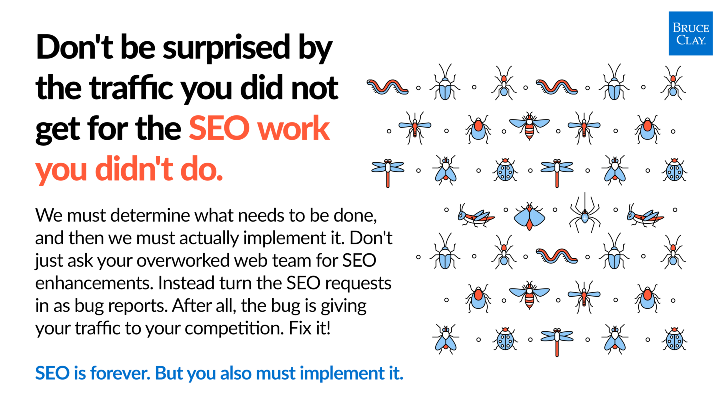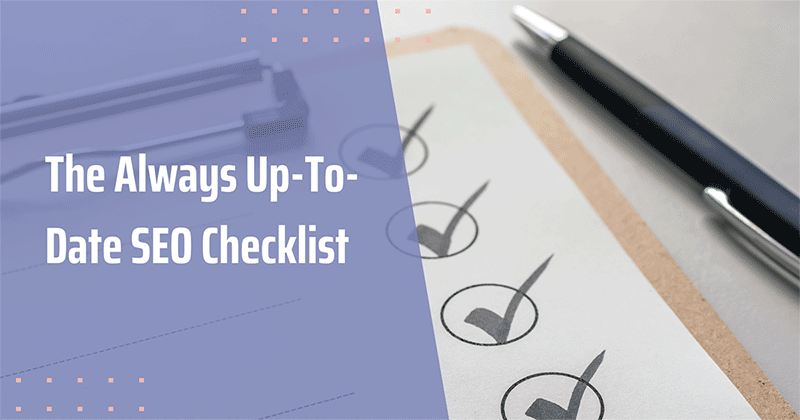What Is an SEO Audit? Why Do an SEO Audit? How To Do One?

What exactly is an SEO audit? Why should you do it? And what is the best way to do it? In this article, I’ll give a high-level overview of how an SEO audit can:
- Improve search engine rankings
- Drive organic search traffic
- Increase revenue
Jump to a section here:
- What is an SEO audit?
- Why do an SEO audit?
- How to do an SEO audit
- SEO audit: The bottom
- FAQ: What are the different levels of SEO audits, and which one suits my needs best?
What Is an SEO Audit?
An SEO audit is a website analysis that looks at issues hindering search engine rankings and areas needing improvement to gain more visibility in the search results and drive organic search traffic.
In this article, I outlined the three levels of SEO audits:
The “Good” SEO Audit: A software tool uncovers superficial SEO issues (many of which may be useful). The tool produces a one-size-fits-all generic report. Appropriate for when you don’t have an auditing budget, or you want to check some basics yourself before starting with an agency. Never a waste, but not a deep dive.
The “Better” SEO Audit: An SEO vendor or practitioner offers additional SEO insights but without many solutions. They can identify problems that data analytics alone can’t uncover. Without in-depth solutions, this only points to possible trouble areas, but sometimes that is all you need.
The “Best” SEO Audit: An SEO agency performs an in-depth technical audit. It requires the labor and expertise of a seasoned SEO analyst(s) who specializes in technical website analysis and SEO business strategy. This is a manual review supported by tools, and it takes many hours.
In all cases, an SEO audit results in a report that addresses the things that need to be fixed. Some SEO vendors build in a consultation service as part of the SEO audit to help clients with things like:
- Prioritizing the recommendations based on SEO impact for your site, niche or business
- Knowing how to implement the changes on your website even when it seems impossible
- Confirming any changes you have made to be sure they are correct (partial implementation is common)
An SEO audit looks at many areas of a site that could impact search engine optimization. Every SEO vendor is different, but here’s a sample of what an SEO audit looks at:
- Keywords, rankings, and traffic
- On-page factors, such as HTML components, internal linking, navigation linking, URL structure, and how to optimize for mobile, local, specific search engine results features and different search verticals
- Off-page factors like the inbound link profile, including a competitive link analysis and how to get rid of links that hinder the site’s performance
- Server issues that review the XML sitemap, 404 pages, indexing, and crawling errors, server errors and security, 301 redirects, and site performance and page speed
Why Do an SEO Audit?
An SEO audit is the best first step in creating an SEO strategy based on your specific website, niche, and business goals.
Whether you are recalibrating your SEO, redesigning a site, or starting out with a new website, an SEO audit can help you optimize every area. This ensures the site is primed to compete in the search results.
A thorough audit takes time. (Here at Bruce Clay Inc., we spend up to 160 hours preparing, delivering, and following up on each audit.) SEO expertise is not a core competency of many businesses. That’s why hiring an SEO vendor can be useful.
Even when a brand has an in-house SEO team, getting an outside analysis can help solve the tough SEO problems.
Learn more: See these case studies to learn more about how an SEO audit improves search engine rankings, organic traffic, and revenue.
How To Do an SEO Audit
To perform an SEO audit, you can either use software tools or hire an SEO professional, consultant, or agency.
The results you get will vary based on which option you choose. Goals and budgets are often a factor when it comes to which option a company chooses (using tools or hiring a consultant or agency).
If you’re just looking to use tools, I outlined my five favorite audit tools in this article:
- Nibbler
- SEO-Detective
- UpCity
- SEOptimer
- WebPageTest.org
If you’re going to hire someone, an SEO audit can be a standalone service or a way to test out an agency or consultant before a longer-term engagement.
In fact, Google recommends asking for an SEO audit as a first step before hiring potential SEO agencies and consultants (and includes key advice about “guaranteed” first-place rankings):
Ask for a technical and search audit for your site to learn what they think needs to be done, why, and what the expected outcome should be. You’ll probably have to pay for this. … Your prospective SEO should be able to give you realistic estimates of improvement, and an estimate of the work involved. If they guarantee you that their changes will give you first place in search results, find someone else.
This advice is often wrongly interpreted as “demand a free audit” from a potential SEO company. If you do run into a company that does a free audit, it’s likely a surface-level report run from software tools.
With countless variables in the search engine algorithms, a free audit is usually of minimal value and seldom proves the value of the SEO agency.
To put this into perspective, when we do a professional SEO audit, we manually check a long list of items that help us discover SEO issues. This can take hundreds of hours over 10 weeks as part of a six-month program.
After the delivery of the report and discussions of the findings, we work with the client’s internal team for three months to mentor, consult, guide, and confirm the implementation of our findings.
That is an effective SEO audit. A “push-the-easy-button audit” is simply not going to get you top-three rankings. Do not be surprised by the results you did not get for the work you did not do.
Read more: How to Evaluate an SEO Company Using Google’s Own Guidelines
SEO Audit: The Bottom Line
An SEO audit is a website analysis that looks at issues hindering search engine rankings and offers areas for improvement. This is so that website owners can gain more visibility in the search results and drive organic search traffic. (Even more revenue!)
SEO audits are the best first step in creating an SEO strategy based on your specific website, niche, and business goals — no matter what stage the website is in.
To perform an SEO audit, you can either use software tools or hire an SEO professional, consultant, or agency. Of course, the results you get will vary based on which option you choose.
Here’s where you can find out more about our professional SEO Site Audit or contact us for a free quote.
FAQ: What are the different levels of SEO audits, and which one suits my needs best?
Search Engine Optimization is essential for online success, yet getting started may be daunting. It is therefore vital that you gain an understanding of all the different types of SEO audits available and select an audit that best meets your individual requirements so that your SEO strategy meets them all.
Level 1: Basic SEO Audit
This is the entry-level audit suitable for beginners or those with limited resources. It focuses on fundamental issues like meta tags, keyword optimization, and site speed. A basic audit is a great starting point, ensuring your website’s essential SEO elements are in place.
Level 2: Technical SEO Audit
For more in-depth insights, a technical SEO audit is the next step. This audit assesses technical aspects, such as website structure, mobile-friendliness, and indexing. It’s ideal for businesses with medium-sized websites seeking to enhance user experience and technical performance.
Level 3: On-Page SEO Audit
This audit hones in on your content. It evaluates keyword usage, content quality, and internal linking. If your goal is to improve your content’s visibility and relevance, an on-page SEO audit is invaluable, especially for content-heavy websites.
Level 4: Comprehensive SEO Audit
At the highest level, the comprehensive SEO audit covers everything. It includes elements from the previous levels and adds competitive analysis, backlink assessment, and an in-depth examination of your entire digital footprint. This level suits businesses committed to dominating their niche and outperforming competitors.
Choosing the Right Level for You
The best level of SEO audit for your needs depends on your goals, budget, and website complexity. Start with a basic audit if you’re just getting started or have limited resources. Gradually progress to higher levels as your site grows and your objectives become more ambitious.
The different levels of SEO audits cater to various needs and stages of online development. Consider your current situation, long-term goals, and available resources when selecting the right audit level.
Step-by-Step Procedure
- Determine your current SEO knowledge and resources.
- Define your website’s goals and objectives.
- Assess your website’s size and complexity.
- Begin with a Basic SEO Audit if you are new to SEO or have a limited budget.
- If your website has technical issues, proceed to a Technical SEO Audit.
- For content optimization, opt for an On-Page SEO Audit.
- If you’re aiming for comprehensive improvements and competitiveness, consider a Comprehensive SEO Audit.
- Research and choose a reputable SEO audit service or software.
- Request a sample audit report if available.
- Provide access to your website or data as required.
- Review the audit scope and pricing.
- Ensure the audit covers the necessary aspects, including technical, content, and backlinks.
- Implement recommended changes and improvements.
- Monitor your website’s performance and rankings.
- Adjust your SEO strategy based on audit findings.
- Repeat the audit periodically to track progress.
- Consider seeking expert advice if needed.
- Continuously educate yourself on SEO best practices.
- Keep up-to-date with search engine algorithm changes.
- Adapt your SEO strategy over time to align with evolving business goals and industry trends.

15 Replies to “What Is an SEO Audit? Why Do an SEO Audit? How To Do One?”
This is a challenging issue to answer since the answer mostly relies on what you’re looking for in an audit tool and how much money you have to spend. However, in general, I think that every firm may benefit from using auditing tools.
Informative and detailed explanation on seo audit thanks for sharing. I’ll use this to implement in our site which is focused on providing a solution for launching a crypto exchange
SEO audit is to find the improvements of the website. We can audit the website manually as well. Thanks for sharing the info!!
One of the best guides that I have read as a beginner. No doubt SEO audit is very basic to develop a strong and powerful SEO strategy for your business. If you are doing it on your own must do an SEO audit before you plan something and if you are getting services from any third person ask about the audit and their progress on it. Thanks for providing us by the method and sources for creating an SEO audit.
This article is very useful and amazing for me and those who do marketing through SEO.
This article so knowledgeable for me ,I get lots of information through this article.You tell about proper seo audit in a good way.
Thank you for this very useful article. I’m glad that you mentioned those five tools which could be beneficial for people like me to do a proper SEO audit.
LEAVE A REPLY










